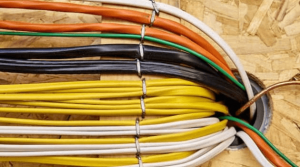Last Updated on April 10, 2022 by Kevin Chen
The cost of rewiring a house ranges from $3,000 to $25,000. The cost of home rewiring includes both labor and materials costs, which may vary depending on the age and size of your home.
In other words, rewiring a home entails removing the old wires and replacing them with a contemporary, non-metallic wire enclosed in plastic. Because obsolete wiring, particularly the knob-and-tube kind used from the 1880s to the 1940s, and aluminum wiring prevalent in houses built between 1965 and 1972, cannot handle current electrical equipment and needs, rewiring a home is critical for the safety of your home and family. Wiring that is more than ten years old can be a fire hazard. This isn’t the type of improvement you want to put off in favor of something else.
There are a few telltale signals that your home is in desperate need of rewiring. If your circuit breakers are constantly tripping, you detect a persistent burning odor, or you notice discolored outlets or switches, your home may require new wiring right away. If your property is older than 25 years or you want to make a room addition or a big redesign, changing the wires in your home may be necessary, even if you don’t notice anything else.
Rewiring a home might be expensive, but it could be a once-in-a-lifetime investment. And because it’s such a significant investment in your home, you want to get it right. This article will look at why rewiring a house is so expensive.
What Is an Electrical Rewire?
All of your appliances, lighting, plugs, and other electronic equipment are powered by an electrical wiring system in your home. Electrical wiring, like anything else, will deteriorate over time, especially given the high electricity demands of the ordinary modern home.
Your electrical system and wiring will need to be replaced over time to ensure safety, comply with current requirements, and operate at peak efficiency. In a word, rewiring a home entails replacing all wiring and upgrading the consumer unit.
When Does a House Need Rewiring?
We believe homeowners must be aware of the warning indications that their home needs to be rewired in this area. Here are some warning indicators to keep an eye out for:
Electric Keeps Tripping Out Regularly
This is related to your consumer unit and could indicate that your home requires rewiring. Another symptom could be dimmer lighting or the need to change bulbs frequently.
Cracking or Buzzing Noise Around Your Electrical Components
This is a sure clue that something is wrong with your wiring. This could potentially indicate blown fuses that need to be replaced or updated due to defective wiring.’
Outdated Consumer Unit and Fittings
Your consumer unit is built of wood, has cast iron switches, obsolete or fractured plug sockets, black cabling/old cable colors, no labeling, or no RCD (residual current device), which is a lifesaving device that prevents severe injury or, in the worst-case scenario, lethal electric shocks.
Discoloration of Wiring or Fittings
Because discoloration is frequently caused by constant overheating and burning, it could be a major warning that you require a rewire.
Your House Has Not Been Rewired Within 25 Years
Things move quickly, and your electrical wiring is no exception. We recommend hiring a trained electrician as soon as possible if your property has not been rewired in the last 25-30 years.
What Does Rewiring a House Involve?
Our electricians are frequently asked about the process of rewiring a home, so we thought it would be helpful to share it with you. Rewiring a home typically entails the following:
Planning & Budgeting
You must prepare and budget before rewiring your home. Rewiring your entire house or even a single room is not inexpensive, and once begun, it must be completed professionally. You can’t leave an electrical rewiring unfinished, so make sure you have enough money to finish it. This includes obtaining an estimate from an electrical contractor for the cost of rewiring a home.
It’s also crucial to think about what kind of fittings and components you want to be installed. This involves deciding how many lights, light switches, plug outlets, and other power points you want throughout the property.
Choosing an Electrician & Getting Quotes
When house rewiring, make sure the electrician is entirely skilled, trained, and licensed. If you have any doubts, you should request documentation when you meet with them. The significance of this cannot be overstated. Because not all electricians charge the same prices, we recommend acquiring three to four quotations to ensure fair pricing for your rewire. Please keep in mind that inexpensiveness does not always imply quality!
Existing Wiring Inspection
When determining whether or not a house needs to be rewired, we always recommend having an electrician inspect your current wiring and installations. If the electrician finds your wiring to be safe and up-to-date, you may be able to avoid the cost of a full rewire.
Fitting Your New Wiring & Components
If the examiner determines that a complete rewire is required, the process typically begins with removing old wiring and installations from beneath the floor and inside the walls. From here, the new wiring and consumer unit will be put in the same space as the old cabling (in most situations).
Following the installation of the new wire, the electrician will install new electrical components such as sockets, lights, switches, and anything else specified. Please keep in mind that installing new fixtures may necessitate cutting into walls and ceiling spaces.
Post-Installation Tests
After your home has been completely rewired, all installations will need to be retested. This is also known as an EICR Certificate or an Electrical Installation Condition Report. If the test turns up with no problems, you’ll be given an electrical safety certificate to indicate that you’re up to date on the newest regulations. Keep this certificate in a safe place. This is especially significant if you own a rental property or plan to sell your home.
How Long Does It Take to Rewire a House?
When estimating how long it will take to rewire a house, consider the size and number of rooms. Complete wiring of an average house (3-4 bedrooms) can take up to 7 days to complete. The length of time it takes to rewire a house, on the other hand, is determined by the size of your home and the number of new components you have installed.
Electrical Rewires Cost Breakdown
We felt it might be helpful to offer rough cost breakdowns in this section to assist you with planning and budgeting. Prices include labor, materials, final sign-off, and notification from building control, which you should factor into your request for estimates.
As we’ve previously stated, when it comes to something as important as your home’s electrical system and wiring, cheap does not equal good.
Reasons Why the Cost to Rewire a House Is High
Most Houses Are Old
The electrical wiring in older homes may be obsolete and need updating. However, labor may be more expensive because it is more difficult to reach. Electricians will have to create tiny holes in the walls and then fish out the wires to protect the architectural integrity of antique residences.
Furthermore, your ancient property may require new outlets and switches to be carved into the walls, which could result in you paying extra for labor and materials. These additional costs rise in direct proportion to the size of your property.
Furthermore, most older homes present additional challenges, such as no access to the attic or a clear path beneath the house. Because of how the foundation was laid, there is frequently a maze under the house.
Electrical Panels Need Upgrading Too
You may need to upgrade the electrical service panel if you want a house wiring system capable of handling more power, which is why most individuals perform a rewiring in the first place. A service drop, disconnect, panel, wiring, piping, and possibly even a new weather head are all part of this upgrade.
Upgrading your electrical panel will increase the cost of the job, and the extent of your update will determine the additional cost. If you have a 60-amp panel and want to upgrade to a 100-amp system, the cost will be different than if you want to upgrade from a 60 or 100-amp system to a 200-amp system.
Labor Can Be Extensive
If you need to open and fix walls as part of the project, expect to pay $5 to $8 per square foot, which is more than double the cost of a normal house rewiring. Some projects may include creating holes in the walls to run wire, which may need to be fixed later.
Running wires via the basement or attic is a far more difficult task. After the wiring is completed, the cost of repairing the walls might be as much as 10% to 15% of the total project cost. Also, if new electrical circuits are required to handle new switches or outlets, this adds to the labor.
Permits & Inspections
Home rewirings may necessitate the acquisition of permits and the scheduling of inspections, both of which incur additional costs. The cost of a permit might range from $200 to $900. The cost is determined by municipal regulations, which may require you to obtain a permit and even hire an inspector to inspect the electrician’s work. For example, if you’re replacing knob and tube wiring, you could need special permission.
Knob & Tube Wiring Is Involved
When a home needs rewiring, it’s usually due to obsolete wiring, most commonly knob and tube. The cost of this type of replacement is usually higher. Because Knob & Tube wiring lacks a ground wire, it is necessary to rewire your home. As a result, most insurance companies refuse to cover household electrical fires if the wiring is of this sort.
Conclusion
If you own an older home that can’t accommodate modern technologies, you may need it rewired. The cost of rewiring a house is determined by the sort of work that has to be done and other criteria such as the size of your home.
Lastly if you need to purchase any electrical component, contact us at ICRFQ, we are the best electrical components manufacturer in China.
If you want to find more Electronic Components Distributors, please check out the following articles:
Electronic Components Distributors In the USA
Electronic Components Distributors In UK
Electronic Components Distributors In China
Electronic Components Distributors In India
Electronic Components Distributors In Singapore
Electronic Components Distributors In Malaysia
Electronic Components Distributors In Vietnam
Electronic Components Distributors In South Korea
- Where to buy IC chips? The Best Guide? - March 26, 2024
- Breaking Down Barriers: Overcoming Obstacles in Cross-Border Electronic Component Trade - March 4, 2024
- Everything You Need to Know About Amplifier IC Chips - March 4, 2024







